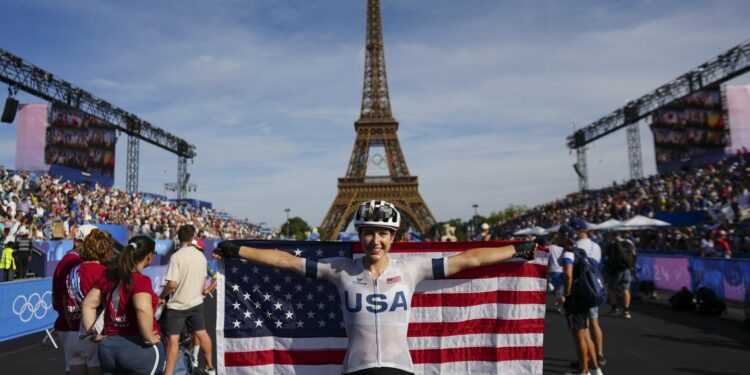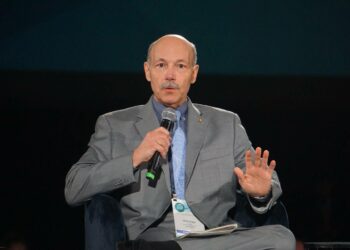PARIS — With the Eiffel Tower behind her and the sun shining at the Paris Olympics, Alaska’s Kristen Faulkner stood atop the podium with her hand on her heart as the American national anthem played.
Briefly, she closed her eyes as the enormity of her win in the women’s road race started sinking in.
Faulkner, who grew up in Homer and made the Olympic team as a replacement, became the first American rider in 40 years to win a medal in the event.
She timed her attack to perfection against vastly more experienced riders. Among them was Dutch rider Marianne Vos, merely one of the greatest female cyclists of all time.
“It’s a dream come true,” Faulkner said. “It’s the best feeling in the world. I don’t know how to describe it.”
![]()
![]()
![]()
The 98-mile route started and finished in Paris, with Faulkner crossing the line at the Trocadéro in a fraction under four hours.
Faulkner finished 58 seconds clear of Vos, Lotte Kopecky of Belgium and Blanka Vas of Hungary, who were separated by a photo finish with Vos taking silver and Kopecky clinching the bronze.
Faulkner and Kopecky caught up Vos and Vas with about three kilometers left. As Faulkner attacked, the other three hesitated and then could not catch her.
She only had the Eiffel Tower and glory ahead of her.
Faulkner joins a pair of other athletes with Alaska connections to earn medals in Paris. Eagle River’s Alev Kelter earned bronze as part of Team USA’s rugby sevens squad. And former UAF standout Sagen Maddalena claimed a silver medal as part of Team USA’s riflery team.
![]()
The 31-year-old is the first American to win a road race medal of any color since the 1984 Los Angeles Games, when Connie Carpenter and Alexi Grewal swept the gold medals.
Faulkner took a winding route to professional cycling.
[Earlier coverage: Navigating twists and turns, Alaska cyclist Kristen Faulkner reaches the Olympics with a key decision left to make]
She was a varsity rower for Harvard, then went into investment banking after her graduation in 2016. She began riding for fun on the streets of New York City, and during her first year as a pro she continued to work full-time for a Silicon Valley firm.
“I took a really big risk a few years ago to come to pursue my dream,” she said. “I made it happen.”
![]()
Faulkner only learned how to clip in pedals in 2017.
“It has been a fast trajectory,” she explained. “Even for the people closest to me it’s been a whirlwind.”
Her approach to cycling was forged from working as a venture capitalist.
“I learned how to calculate risks and assess risks,” she said. “In a race I take that mind set with me: What is the risk-reward ratio? Knowing when to go all in.”
Faulkner won the U.S. road race title in May, but had not qualified for the Olympic road race because Chloe Dygert and American time trial champion Taylor Knibb earned the two automatic selections. It wasn’t until Knibb withdrew last month to focus on the Olympic triathlon that Faulkner was added as a replacement.
![]()
Now she’s aiming for a second medal — in team pursuit, which begins Tuesday with qualifying.
“I said I’d only do the road race if I felt strong and felt I had a chance of a medal,” Faulkner said. “I knew that it would be a really tough race but if I was racing, I was racing to win. That was a promise I made to my team pursuit teammates.”
Huge crowds cheered the riders as they rolled through Paris’ Latin Quarter and then along past the Orsay museum — once a train station.
The trek concluded with three climbs up to Montmartre, the area of Paris known for its cobblestoned passageways, its quaint artistic atmosphere and, most visibly, the white Sacré Coeur basilica perched imperiously atop Montmartre hill as if watching over Parisians.
Afghan sisters Fariba and Yulduz Hashimi were briefly part of an early breakaway, but they were soon caught. Slovakian Nora Jencusova then broke away on her own before being joined by the Hashimis and two other riders.
![]()
![]()
After entering Paris, riders zoomed past crowds flocking around the Louvre museum — home to the Mona Lisa — and the breakaway was swallowed up by the peloton.
As riders tackled the emblematic short climb up Butte-Montmartre for the first time, a new group formed at the front — Vos, Italian Elisa Longo Borghini and Faulkner. Kopecky chased hard on her own and caught up the lead group with about 25 miles left.
Defending champion Anna Kiesenhofer of Austria, who won the race in Tokyo because everyone else forgot she was in front, finished nearly eight minutes back in 52nd spot.
With a dozen miles left, Vos and Bas attacked. They didn’t open up enough of a gap and Faulkner waited patiently.
“I knew that Kopecky wanted to catch the front two, so I knew she’d ride with me. I knew that if we caught them, then I had to attack because I couldn’t beat any of them at the line,” Faulkner said. “The best place to attack was right after we caught them and everyone was tired. That was my chance, I practiced my late attack several times this year.”
Faulkner ended America’s long wait for a road race medal dating back to the Los Angeles Games.
She can now defend her medal there in 2028.
This is a developing story and will be updated.
Source link : http://www.bing.com/news/apiclick.aspx?ref=FexRss&aid=&tid=66b085f9b10d4a0c8e4619bdc37a21d7&url=https%3A%2F%2Fwww.adn.com%2Fsports%2F2024%2F08%2F04%2Falaskas-kristen-faulkner-wins-landmark-gold-in-womens-olympics-cycling-road-race%2F&c=8963792960905449566&mkt=en-us
Author :
Publish date : 2024-08-04 05:40:00
Copyright for syndicated content belongs to the linked Source.







